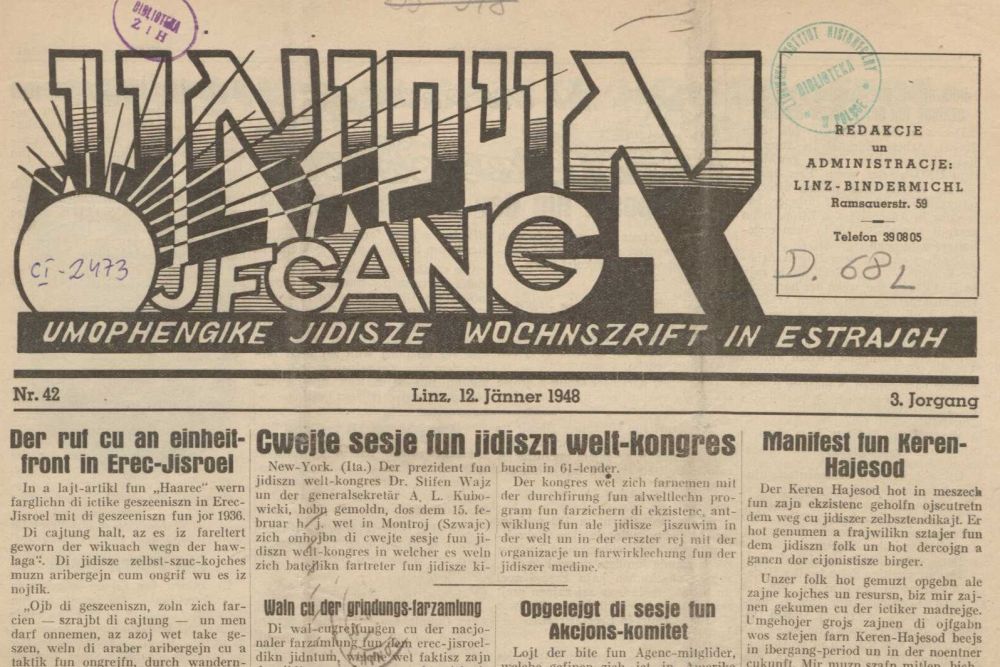Menu
- Aktualności
- Wydarzenia
- Oneg Szabat
- Zbiory
- Nauka
- Wystawy
- Edukacja
- Wydawnictwo
- Genealogia
- O Instytucie
- Księgarnia na Tłomackiem
- Kwartalnik Historii Żydów


Among the many languages spoken during the Holocaust, Yiddish stands out in the severity of the blow that it suffered. Linguist Neil Jacobs estimates that the Holocaust took the lives of roughly 5 million Yiddish speakers, out of 11 million living worldwide before the war. Of the approximately 6 million Jews who died in the Holocaust, roughly 85 percent were Yiddish speakers. There is, thus, no narrative of modern Yiddish culture that does not hinge on this event. Jeffrey Shandler aptly describes the Holocaust as “the great breach in [Yiddish cultural] history.”
Such scholarly characterizations are surely accurate: By eradicating roughly 45% of the world’s Yiddish speakers, and dislocating even more, the events of the Holocaust drastically and irreversibly altered the conditions of speaking, living, and writing in Yiddish. However, what remains underexplored is what happened to Yiddish within this moment of great historical rupture—not in quantitative measurements of language use, but in terms of how the language changed as a means of thought, expression, and human connection. Confronting the Holocaust through the specificities of Yiddish also requires us to consider certain cultural and lingual hierarchies that have long shaped the study of this atrocity.
In the early 1960s, when scholars were beginning to build an international, academic discourse around the Holocaust, Yiddish was too often relegated to the sidelines. While certain academic Holocaust historians with a personal connection to the language incorporated Yiddish sources even in the early phases of the field, on the whole Yiddish remained a marginal language of international Holocaust research for several decades.
Likewise, within newer currents of Holocaust Studies—such as those focusing on cultural representations of the Holocaust, comparative genocide studies and memory politics—Yiddish has likewise been relatively neglected. Of the many books, films and songs about the Holocaust in Yiddish, few have entered mainstream Holocaust memory. Yiddish does not appear centrally in any school curricula or national monuments and there is comparatively little ongoing intergenerational transfer of Holocaust narratives in Yiddish. Partly for this reason, Yiddish in Holocaust Studies was for a long time, in Perla Sneh’s apt formulation, an “absent absence.”
This has begun to change. Within Holocaust scholarship, scholars such as Samuel Kassow, David Roskies, Laura Jockusch, Katarzyna Person, Dominic Williams and Nicholas Chare, Mark Smith and others have published groundbreaking research based on the abundant Yiddish language testimony that emanated from East European Jewish communal efforts, both during and after the Holocaust. Likewise, reconstructive historians with no personal connection to Yiddish have started learning the language in order to access new types of documentation: testimonies, meeting notes, and other sources that were previously ignored.
This conference seeks to build on the critical contributions of this previous scholarship and, working together with participants from around the world, articulate a purposive, innovative role for Yiddish in the future of Holocaust Studies. As one key contribution, we hope to more fully illuminate not only the factual, documentary value of Yiddish sources, but also their intellectual and philosophical richness. We hope to examine the complex ways that Yiddish speakers and writers creatively engaged with questions of ethics, identity, community, culture and barbarity, the meaning of home, and the human status in extremis, among many other conceptual and existential issues.
Key questions of the conference will include:
● How did Yiddish speakers and writers creatively respond, in Yiddish, to the dawning realization, in Samuel Kassow’s words, that “Yiddish, the very language that had bound writer and reader in a circle of mutual understanding, was itself being destroyed?"
● How did Yiddish authors writing within the events of the Holocaust envision their audience when the prospect of ever reaching any audience was subject to radical contingency?
● What cultural, social, and political tensions emerged between Yiddish and other languages as they were used for social communication and/or official administrative purposes in the ghettos and camps?
● Why and in what circumstances did multilingual authors choose to write in Yiddish and why not? How has Yiddish served the work of memory and cultural rebuilding after the war?
● How have Yiddish speakers and writers theorized the Holocaust and its aftermath?
● How did the Holocaust shift the balance between spoken and written language?
● How did the Holocaust change Yiddish and how should we research that question?
With these questions intended as a basis for—but not a limit to—conversation, we seek papers from all relevant disciplines, including history, linguistics, literature, musicology, philosophy, and sociology.
In addition to traditional lecture panels, we will hold a special “Works in Progress” workshop for graduate students. Presenters will submit scholarly papers as advanced reading and receive feedback during the conference.
-Applicants should send a resume and a 300 word lecture or workshop paper proposal to goldreichinstitute@gmail.com by October 15, 2023
-Graduate students wishing to present in the “Workshop Session: Works in Progress” should mark their interest in that session on their application. (Participants can present either in a frontal panel or in the workshop, but not both.)
-All participants accepted to the conference will be offered two nights room and board near Tel Aviv University. Funds for air travel are limited and will be allocated based on need. Please mark on your application if you plan to request air travel reimbursement or if your host institution may help defray these costs.
Conference Organizers:
Dr. Hannah Pollin-Galay, Tel Aviv University
Prof. Sven-Erik Rose, University of California Davis
Sponsors:
The Jona Goldrich Institute for Yiddish Language, Literature and Culture at Tel Aviv University
The Fortunoff Video Archive for Holocaust Testimonies at Yale University
Academic Committee:
Stephen Naron, Fortunoff Video Archive
Dr. Dominic Williams, Northumbria University
Dr. Katarzyna Person, Jewish Historical Institute, Warsaw
Confirmed speaker: Prof. David Roskies